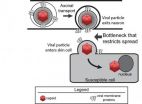(Press-News.org) CHAMPAIGN, Ill. — Adopting a loser-pays-all rule for criminal litigation would likely be feasible only if the rule applied to defendants who are wealthy, says a study from a University of Illinois law professor.
Nuno Garoupa, the H. Ross and Helen Workman Research Scholar in the College of Law, says a loser-pays-all rule could deter some crime when it's applied to either a corporation or an individual with deep pockets. But when defendants are not wealthy, such cost-shifting would be "wholly inappropriate," he says.
"On the defendant's side, the problem is that a significant percentage of the accused in the U.S. are poor, and they might not have the financial resources to repay the prosecutor's costs, should they be found guilty," Garoupa said. "So that might explain why this is not an issue we hear about too often in the U.S. But with the increase in financial crimes of the past decade, you could argue that there is an entire subsection of cases where you have corporate defendants, or very wealthy individuals as defendants, for whom money is not an issue."
For that minority of cases, having a loser-pays-all rule in place could lead to greater criminal deterrence as well as a reduction in legal errors, the paper says.
"People might think twice if they know they'll have to pay back the costs of their prosecution," he said.
According to Garoupa, a co-director of the Illinois Program on Law, Behavior and Social Science, unlike in the U.S., where each party pays its own costs, many common law legal systems use loser-pay-all rules in civil litigation, with the losing party paying for the legal fees and costs incurred by the winning party.
"There has been a lot of discussion about cost-shifting rules in civil litigation, and in that respect, the U.S. is an exception in that most other countries tend to use those types of rules very frequently," he said. "The question is, why don't we see the same type of discussion in criminal litigation. And what we argue in the paper is that there are specific issues in criminal litigation that might explain why a loser-pays-all rule would be more problematic in the U.S."
In criminal litigation, the prosecutor is a public agency funded by taxpayer dollars, not a private party.
"There might be some issues of where the money goes if the prosecutor prevails," he said. "There also might be other complications. If you force companies to pay for the prosecutor's legal costs, they might be less likely to settle, or more likely to invest more money on criminal litigation, so the probability of losing goes down."
It's also possible that prosecutors would go after higher profile cases in search of a big financial payday, which would leech away resources from pursuing less wealthy criminals.
"In practice, apart from some big headline cases, things in the U.S. tend to go into plea-bargaining," Garoupa said. "It's unclear that a loser-pays-all rule would actually help or force more plea-bargaining. One of the explanations for why we see so much plea-bargaining is that prosecutors do not have enough resources or are afraid of
over-spending their budget. But if you have a rule that says if you win the case in court, the other side pays for your budget, then you might say, 'I don't need to go to plea-bargaining so often.' "
Whether that would be good or bad depends on the view one has about the role of plea-bargaining in American criminal procedure, Garoupa says.
"Some legal experts think plea-bargaining is great while others think it's a
not-so-great aspect of the American judicial system," he said. "So a rule that changes this one way or the other would get into this division of views that already exists."
Another example of an unintended consequence of implementing such a rule: If a prosecutor goes after a client with deep pockets and loses, would taxpayers be on the hook for the (presumably) exorbitant legal defense fees?
"That's one possibility, but you could also argue that prosecutors might also be more careful," Garoupa says. "The other aspect is the fact that prosecutors wouldn't pay this out of their own money. Many foreign countries have passed laws regarding the extra-contractual liabilities of prosecutors and judges. This is essentially where legal systems allow you to sue prosecutors or judges because you think they were negligent in the way they performed their job. So rather than relying on the system we have in the U.S. of impeaching judges or firing prosecutors, it allows you to directly file a lawsuit against them. And this is a big deal, because if they lose, it's not the taxpayers' money that is on the line, but the personal fortune of the prosecutor or judge."
Garoupa says the paper is not a mere thought experiment, since such a rule could have significant implications for anti-racketeering prosecutions and the financing of law enforcement activities.
"The policy implications are clear: There is probably a good idea as to why this would be less popular in criminal litigation than in civil litigation, and why this could be a good idea in the criminal litigation of a corporate or wealthy defendants," he said. "But we would have to think how to minimize the harm to the wealth-constrained, which is something that policymakers haven't been too worried about. You also have to think about how this would affect the strategy of the prosecution and the defendants.
"When you take into account all of the complexities, it's unclear if that's a good or bad idea. We argue in the paper that people tend to see the positive side, and that they're not looking at the other side, which is that it would likely make criminal litigation more expensive, and it would also probably force prosecutors to spend more money on litigation."
INFORMATION:
The paper, co-written by Luciana Echazu, of Clarkson University, will appear in the International Review of Law and Economics.
Editor's notes: To contact Nuno Garoupa, call 217-333-2502; email ngaroupa@illinois.edu.
The article, "Why Not Adopt a Loser-pays-all Rule in Criminal Litigation?" is available online.
Loser-pays-all rule in criminal cases could work for wealthy defendants
2012-11-05
ELSE PRESS RELEASES FROM THIS DATE:
Checklists in the operating room: More safety for patients
2012-11-05
The use of the World Health Organization's Surgical Safety Checklist in the operating room considerably lowers the risks of surgery. This is the conclusion of Axel Fudickar and co-authors in their article in Issue 42 of Deutsches Ärzteblatt International (Dtsch Arztebl Int 2012; 109(42): 695).
The most common errors in safety-related behavior in the operating room are attributable to inadequate communication and teamwork. The Surgical Safety Checklist, which was introduced by the World Health Organization in 2007, has the main effect of improving commmunication of the ...
2001-2002 drought helped propel mountain pine beetle epidemic, says CU study
2012-11-05
A new University of Colorado Boulder study shows for the first time that episodes of reduced precipitation in the southern Rocky Mountains, especially during the 2001-02 drought, greatly accelerated development of the mountain pine beetle epidemic.
The study, the first ever to chart the evolution of the current pine beetle epidemic in the southern Rocky Mountains, compared patterns of beetle outbreak in the two primary host species, the ponderosa pine and lodgepole pine, said CU-Boulder doctoral student Teresa Chapman. The current mountain pine beetle outbreak in the ...
Spinal cord injury puts patients at high risk of life-threatening cardiovascular events
2012-11-05
New Rochelle, NY, November 5, 2012—Spinal cord injury (SCI) can disrupt the body's sensitive signaling mechanisms that control blood pressure, breathing, and oxygen delivery to the heart and other organs during changes in body position. Cardiovascular (CV) disease is a leading cause of illness and death following SCI, and changes in baroreflex sensitivity—the body's ability to detect and respond to changes in blood pressure—may be predictive of a CV event. A comprehensive review article on baroreflex sensitivity after SCI is published in Journal of Neurotrauma, a peer-reviewed ...
Etiologic diagnosis of nonsyndromic genetic hearing loss in adult vs pediatric populations
2012-11-05
Alexandria, VA — Genetic testing for a certain mutation in pediatric patients is valuable in determining a cause for unexplained hearing loss, according to a study in the November 2012 issue of Otolaryngology–Head and Neck Surgery.
The study's authors state that testing for some of the most common mutations that cause sensorineural hearing loss in a targeted way, rather than through generalized screening of hearing loss patients, yields the best results.
University of Miami NIH-funded researchers led by Dr. Xue Zhong Liu, a physician-scientist, conducted a nine-year ...
The knowing nose: Chemosignals communicate human emotions
2012-11-05
Many animal species transmit information via chemical signals, but the extent to which these chemosignals play a role in human communication is unclear. In a new study published in Psychological Science, a journal of the Association for Psychological Science, researcher Gün Semin and colleagues from Utrecht University in the Netherlands investigate whether we humans might actually be able to communicate our emotional states to each other through chemical signals.
Existing research suggests that emotional expressions are multi-taskers, serving more than one function. Fear ...
Study supports move toward common math standards
2012-11-05
EAST LANSING, Mich. — A new study analyzing the previous math standards of each state provides strong support for adoption of common standards, which U.S. students desperately need to keep pace with their counterparts around the globe, a Michigan State University scholar argues.
Forty-six states are implementing the Common Core math and reading standards, which nonetheless have come under fire recently by some researchers and would-be politicians.
But William Schmidt, MSU Distinguished Professor of statistics and education, said the Common Core is a world-class set ...
Waste management -- good marketing
2012-11-05
This press release is available in Spanish.
Spanish legislation on waste management changed in July last year. Until then, the consumer was responsible for the disposal of products. According to Mr Unai Tamayo, economist at the University of the Basque Country (UPV/EHU), the new laws "foment the construction of closed systems, such as in taverns: the container being taken out and subsequently returned. Moreover, when a manufacturer launches a product on to the market, once consumed, the packaging is considered waste, and the responsibility for this now falls on the manufacturer ...
Princeton researchers identify unexpected bottleneck in the spread of herpes simplex virus
2012-11-05
VIDEO:
Princeton University research suggests that a common strain of herpes virus causes cold sores with only one or two viral particles, resulting in a bottleneck in which the infection is...
Click here for more information.
New research suggests that just one or two individual herpes virus particles attack a skin cell in the first stage of an outbreak, resulting in a bottleneck in which the infection may be vulnerable to medical treatment.
Unlike most viruses that ...
New research suggests standardized booster seat laws could save lives of children
2012-11-05
Boston, Mass, Nov. 5, 2012— A new study by researchers in Boston Children's Hospital's Division of Emergency Medicine indicates that a nationwide standard on booster seat laws for children 4 feet 9 inches and shorter, or up to 8 years old, would save lives. The findings were published online Nov. 5, 2012, in the journal Pediatrics.
Boston Children's researchers reviewed data from Fatality Analytic Reporting System, analyzing child deaths in motor vehicle accidents, looking specifically at whether the crash and resulting deaths or injuries took place in a state with or ...
Computers 'taught' to ID regulating gene sequences
2012-11-05
Johns Hopkins researchers have succeeded in teaching computers how to identify commonalities in DNA sequences known to regulate gene activity, and to then use those commonalities to predict other regulatory regions throughout the genome. The tool is expected to help scientists better understand disease risk and cell development.
The work was reported in two recent papers in Genome Research, published online on July 3 and Sept. 27.
"Our goal is to understand how regulatory information is encrypted and to learn which sequence variations contribute to medical risks," says ...





